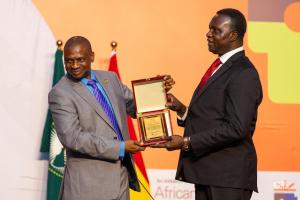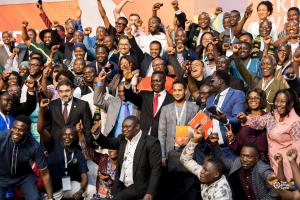Africa Skills Week 2024 draws to a triumphant close: ‘change your country, and change Africa’
Africa Skills Week 2024 draws to a triumphant close: ‘change your country, and change Africa’
GHANA, GREATER ACCRA, GHANA, October 21, 2024 /EINPresswire.com/ -- Africa Skills Week1 (ASW) should be institutionalised as a biennial event to encourage dialogue, experience sharing and collaboration on skills development and employment in Africa, the inaugural conference’s outcome statement and call to action boldly states.
In closing ASW, this communiqué says the conference had achieved enhanced policy dialogue “on the importance of skills development in driving economic growth and social inclusion”; it had increased collaboration between governments, educational institutions, private sector entities and international organisations; it had enhanced knowledge sharing and learning around experiences and best practices in skills development, providing valuable insights; and it had engaged Africa’s youth, ensuring that the outcomes of the week were relevant to their needs and aspirations.
It also lays out seven points in its call to action:
Governments should prioritise the implementation of effective and inclusive skills development policies
Governments, educational institutions and the productive sectors must strengthen partnerships for impact
Governments and educational institutions should promote entrepreneurship through training, mentorship and access to financing
Governments and educational institutions should leverage technology and innovation to enhance skills development and digitalise educational systems
Stakeholders must continue the dialogue around skills development and employment in Africa in various ways, including making ASW a biennial event. It is also recommended that 2025-2034 be declared Africa’s Decade of Skills and Jobs
Implement the call to action of the Youth Summit on Skills, and partner with the youth to build a future where they can realise their full potential
Establish mechanisms to research, monitor and evaluate progress in skills development, and ensure innovation, accountability and sustainability
“Considering Africa’s youthful demographics and its workforce that is projected to double by 2050, by taking these actions, we can collectively address the skills gap in Africa and create a more prosperous and inclusive future for the continent,” the communiqué reads.
A separate Youth Statement also captures the collective voice of ASW’s youthful participants – those Africans for whom ASW has particular significance.
“Recognising that Africa is home to the largest youth population globally, addressing the barriers to skills development is critical for cultivating sustainable livelihoods, economic growth and inclusive development, for the ‘Africa We Want’,” it reads.
The Youth Statement lays out a vision for an Africa in which skills development increases employability; empowers the youth to lead Africa’s growth; takes into consideration the unique contexts of the youth; ensures the inclusion of marginalised groups and expands opportunities for all; and prepares the youth for “the technological revolution” ahead.
“We believe that Africa’s students and youth can lead the continent towards a prosperous and sustainable future through collaboration, inclusivity and innovation. By joining forces, we can create a future where every young African has the opportunity to thrive. Let’s make this vision a reality – together!” the Youth Statement concludes.
ASW has taken place in Accra from 14 to 18 October 2024, themed around “Skills and jobs for the 21st century: quality skills development for sustainable employability in Africa”. This focus aligns with the African Union’s Year of Education in 2024.
The conference is being hosted by the Government of Ghana in partnership with the African Union (AU). It is supported by Germany through the Deutsche Gesellschaft für Internationale Zusammenarbeit (GIZ); as well as by the International Labour Organization (ILO); UN Educational, Scientific and Cultural Organization (UNESCO); World Bank; Ghana’s Commission for TVET (CTVET); and Ghana’s Ministry of Education, and Ministry of Foreign Affairs and Regional Integration.
Daily themes for the conference have revolved around youth, skills development and jobs in the 21st century; aligning skills needs and training; changing perceptions around technical and vocational education and training (TVET); ensuring inclusive skills development for women, displaced people and persons with disabilities; and skills development for African transformation. Delegates from all over the world, representing African, European and global bodies, as well as the youth, have engaged in robust plenary sessions and panel discussions.
The theme of the final day was “Africa digital transformation on skills development and jobs”. In his address at the start of proceedings, Professor Saïdou Madougou, Director in the AU’s Education, Science, Technology and Innovation (ESTI) initiative, reminded the delegates that digital transformation is about more than adopting technology.
“When we talk about innovating education in Africa, we are talking about much more than simply digitising textbooks or putting computers in classrooms. True innovation in education involves rethinking how we teach, what we teach and who has access. It’s about building an inclusive system that equips every child, no matter where they are born, with the skills to thrive in a rapidly changing world.
“Technology can be a game-changer, but it is not a solution on its own. Many African countries are already experimenting with e-learning platforms, mobile education apps and virtual classrooms. But we must ensure that technology addresses the diverse needs of our students, taking into account different learning styles, languages and access to the internet.
“True innovation means creating systems that meet the needs of all students,” Prof. Madougou said.
A highlight of the day was a pitching session in which 10 digital initiatives – finalists out of a total of 611 entries – were given the opportunity to garner one of three African Union Education Innovation Awards. Shortly before the closing ceremony, the winners were announced:
US$25 000 first prize: SimuLab and Science Safari, a virtual science laboratory platform developed by Ghana’s OGames
US$15 000 second prize: Storytelling and Digital Tech for Change, a storytelling initiative for social behavioural change and digital skills by Tanzanian company Tai
US$10 000 third prize: NABU Multilingual App and Web Reader, a multinational initiative that creates original children’s stories in mother-tongue languages
In closing ASW, Ghanaian Minister for Education the Hon. Dr Yaw Osei Adutwum issued a passionate appeal to everyone present to take action.
“Every one of us has our moment,” he said. “The most important [thing] is how you seize the moment. So I want to encourage you: aspire for greatness. Seize the moment. Change your country, and change Africa.”
Ayanda Siswana
Flow Communications
+27 72 597 8219
email us here
1 https://skillsweek-au.org/


